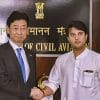Culture
Japan Marks 80th Anniversary of Hiroshima Bombing as Global Threats Shift Its Pacifist Path
Japan marked the 80th anniversary of the atomic bombing of Hiroshima—a moment of reflection shadowed by growing regional tensions and a noticeable evolution in Japan’s national security posture. The solemn anniversary recalled the devastating moment in 1945 when the U.S. dropped the first atomic bomb on Hiroshima, followed three days later by Nagasaki, prompting Japan’s surrender and the end of World War II. The bombings claimed hundreds of thousands of lives, both instantly and in the aftermath from radiation exposure.
Survivors, known as hibakusha, gathered alongside officials and international guests at Hiroshima’s Peace Memorial Park. Doves flew above the Atomic Bomb Dome while Prime Minister Shigeru Ishiba laid a wreath at the Cenotaph. Yet this year’s ceremony came with a striking shift in tone: remembrance now walks hand in hand with readiness.
A Changing Security Landscape
Postwar Japan, bound by a constitution that renounces war, has long embraced pacifism under the U.S. nuclear umbrella. But today, that identity faces increasing strain as Japan reassesses its role amid North Korean aggression, China’s assertiveness in the Taiwan Strait, and Russia’s war in Ukraine. Japan’s Self-Defence Forces need strengthening.
“Ukraine today may be East Asia tomorrow,” said former Prime Minister Fumio Kishida during his landmark 2023 visit to Kyiv—the first by a Japanese leader to an active war zone since WWII.
James Cameron’s Ghosts of Hiroshima : His Most Ambitious and Controversial Project Yet
Japan’s Self-Defence Forces have since engaged in expanded military drills, closer U.S. collaboration, and a more pronounced Indo-Pacific strategy. Earlier this year, the U.S. and Japan agreed to accelerate missile co-production and enhance joint operations.
View this post on Instagram
Voices from the Past Call for Peace
Despite these shifts, some voices remain unwavering. Nihon Hidankyo, the organization representing atomic bomb survivors, continues to campaign globally for nuclear disarmament. Awarded the Nobel Peace Prize in 2024, the group distributed flyers at the memorials urging nations to ratify the Treaty on the Prohibition of Nuclear Weapons.
Among those still speaking out is Tomoko Matsuo, a 92-year-old Nagasaki survivor. “My sister Eiko was only 16. She walked home through flames just to see us one last time,” she told ABC News. “I tell my story so people remember what was lost.”
A Tense Future
Kazuko Hikawa of Nagasaki University warns of the security paradox: nuclear weapons, intended to deter, may inadvertently invite conventional conflict, as seen in Ukraine and Palestine. The threat of future nuclear use, she says, is more real than many believe.
As Japan balances honouring its past with preparing for its future, the Hiroshima and Nagasaki bombings and survivors serve as more than memorials—they are cautionary beacons amid today’s rising global uncertainty.










































